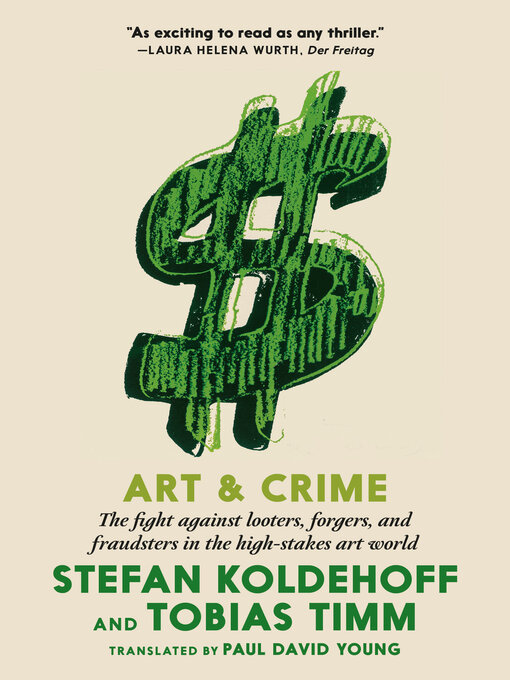- Featured Magazines
- Let's Get Cooking!
- News, Politics, and Business
- Lifestyle Magazines
- Popular Magazines
- All Magazines
- See all magazines collections
Art & Crime
The fight against looters, forgers, and fraudsters in the high-stakes art world
The art world is one of the most secretive of global businesses, and the list of its crimes runs long and deep. Today, with prices in the hundreds of millions for individual artworks, and billionaires' collections among the most conspicuous and liquid of their assets, crime is more rampant than ever in this largely unregulated universe. Increased prices and globalization have introduced new levels of fraud and malfeasance into the art world—everything from "artnapping," in which an artwork is held hostage and only returned for a ransom, to forgery and tax fraud. However, the extent of the economic and cultural damage that results from criminality in the global art scene rarely comes to light. The stories of high-stakes, brazen art crimes told by art experts Stefan Koldehoff and Tobias Timm are by turns thrilling, disturbing, and unbelievable (the imagination for using art to commit crimes seems boundless). The authors also provide a well-founded analysis of what needs to change in the art market and at museums.
From the authors of False Pictures, Real Money (about the Beltracchi art forgery case), Art and Crime includes a chapter on art owned by Donald Trump. It is a thoroughly researched, explosive, and highly topical book that uncovers the extraordinary and multifarious thefts of art and cultural objects around the world.
-
Creators
-
Publisher
-
Release date
July 12, 2022 -
Formats
-
Kindle Book
-
OverDrive Read
- ISBN: 9781644211205
-
EPUB ebook
- ISBN: 9781644211205
- File size: 4017 KB
-
-
Languages
- English
-
Reviews
-
Publisher's Weekly
October 11, 2021
In this engrossing account, Koldehoff and Timm (False Pictures, Real Money) survey the link between art and crime, starting with the 1911 theft of the Mona Lisa from the Louvre and including such recent sensational cases as the 2017 theft of a 220-lb. Canadian gold coin from Berlin’s Bode Museum. The authors make the case that in today’s unregulated art world, many crimes are committed for laundering drug money or hiding stolen assets. (To this day, the FBI suspects the Mafia was behind the unsolved 1990 robbery of 13 works of art from the Isabella Stewart Gardner Museum in Boston.) While most readers know about the art stolen by the Nazis during WWII, it will be news to many that forgeries of Hitler’s own paintings, most of them fake according to one expert, remain a lucrative business. One chapter, “The Fakes President,” describes how President Trump siphoned funds from his charitable fund to buy art, including a portrait of himself. The authors also cover how, when Trump had the Bonwit Teller building demolished to build Trump Tower, he reneged on his promise to preserve the building’s Art Deco friezes and donate them to the Metropolitan Museum of Art—which was technically not a crime. Assured prose bolsters these fascinating tales. True crime fans and aficionados of culture will appreciate this dive into the dark side of the art world. -
Library Journal
January 7, 2022
Koldehoff and Timm's (Falsche Bilder, Echtes Geld, or "Fake Paintings, Real Money," which hasn't been translated from German) ambitious work sets a lofty goal, seeking to illustrate the many ways in which high-profile art and criminal activity overlap. However, in its attempt to cover a huge swath of history and human behavior, the narrative becomes somewhat dry despite coverage of exciting topics such as black-market trade and museum heists. Koldehoff and Timm make clear that the intersections of art and crime are multifaceted, and they effectively examine the relevant issues but don't go further than surface-level details. Some of the best chapters cover the questionable art dealings of high-profile figures like Donald Trump and Imelda Marcos; the exploration of Nazi Germany's impact on the art world is especially well written. However, because much of the book eschews the human-interest elements that most often draw readers to true crime, the stories can feel unsatisfying. Readers, whether art enthusiasts or novices, will undoubtedly learn something new from this volume, but it's not as memorable an experience as it could be. VERDICT Readers interested in the art trade will benefit most from Koldehoff and Timm's work. Those seeking a true crime experience can find more engaging works elsewhere.--Sarah Schroeder, Univ. of Washington Bothell
Copyright 2022 Library Journal, LLC Used with permission.
-
Loading
Why is availability limited?
×Availability can change throughout the month based on the library's budget. You can still place a hold on the title, and your hold will be automatically filled as soon as the title is available again.
The Kindle Book format for this title is not supported on:
×Read-along ebook
×The OverDrive Read format of this ebook has professional narration that plays while you read in your browser. Learn more here.


